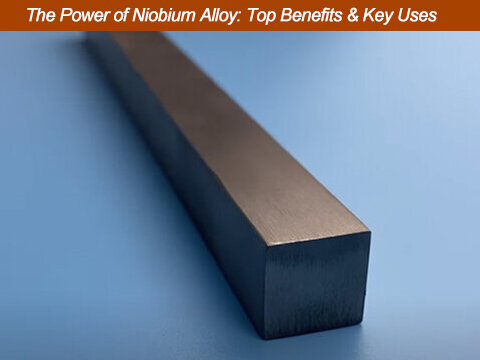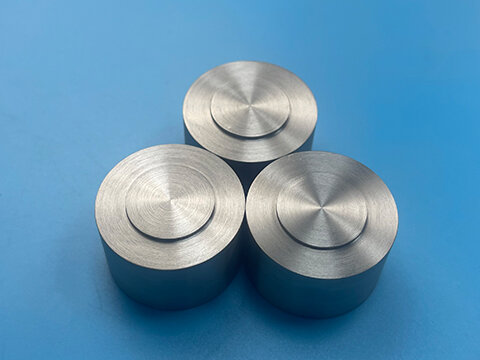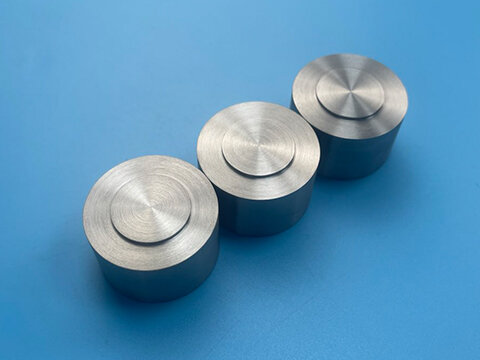Unleashing the Power of Niobium Alloy: Exploring Its Advantages and Applications
views, Updated: July 19, 2024 by aemmetal

Niobium alloy is a game-changer in metallurgy, used in industries like aerospace and automotive to make high-performance parts. Its popularity is due to its unique benefits, such as:
-
Heat and Corrosion Resistance: Niobium alloy can withstand extreme conditions, making it ideal for harsh environments.
-
Lightweight and Strong: This material helps improve fuel efficiency and reduces carbon emissions due to its excellent mechanical properties.
As demand for niobium alloy grows, it's important to understand its potential. This article will explore how niobium alloy is used in aviation, automotive, and construction industries, highlighting how it enhances performance and shapes the future of manufacturing.
Whether you're an engineer seeking new solutions or a business owner looking to improve production, niobium alloy offers unparalleled performance and efficiency. Join us to discover the remarkable advantages of niobium alloy.
Advantages of Niobium Alloy

Niobium alloy offers numerous benefits across various industries:
Exceptional Heat Resistance
One of niobium alloy's primary advantages is its ability to withstand extremely high temperatures. This makes it perfect for applications exposed to extreme heat, such as aerospace components and industrial furnaces. The heat resistance of niobium alloy leads to improved durability and a longer lifespan for these components, reducing the need for frequent replacements and maintenance.
Superior Corrosion Resistance
Niobium alloy excels in corrosion resistance. It forms a protective oxide layer on its surface, shielding it from corrosive environments. This ensures long-term performance and reliability, especially valuable in industries like chemical processing, marine applications, and infrastructure development, where components face harsh conditions.
Outstanding Mechanical Properties
Niobium alloy has a high strength-to-weight ratio and excellent ductility. This combination of strength and light weight makes it an attractive choice for applications where reducing weight is crucial, such as in the automotive and aerospace industries. Using niobium alloy allows for the design and manufacture of lighter, more fuel-efficient vehicles and aircraft, ultimately improving energy efficiency and reducing carbon emissions.
Types of Niobium Alloy
Niobium Alloy is a composite material composed primarily of niobium (Nb), combined with other elements to enhance its properties. Understanding the different types is essential for selecting the right material for specific industry needs.
Nb-Ti (Niobium-Titanium) Alloy
Nb-Ti alloy combines the exceptional strength and corrosion resistance of niobium with the enhanced ductility and thermal conductivity of titanium. It is widely used in the aerospace, automotive, and medical industries, where these properties are highly valued.
Nb-Zr (Niobium-Zirconium) Alloy
Nb-Zr alloy offers improved high-temperature strength and creep resistance, making it ideal for applications exposed to elevated temperatures. It is commonly used in the production of superalloys and heat-resistant components.
Nb-Hf (Niobium-Hafnium) Alloy
Nb-Hf alloy exhibits exceptional resistance to oxidation and high-temperature strength. This makes it suitable for producing refractory metals and components that operate in extreme environments, such as those in the aerospace and nuclear industries.
Ta-Nb (Tantalum-Niobium) Alloy
Tantalum Niobium alloy combines the high corrosion resistance and biocompatibility of tantalum with the strength and heat resistance of niobium. This makes it particularly useful in the medical industry for implants and surgical instruments, as well as in chemical processing and electronics.
Other Niobium Alloys
There are other niobium alloy compositions, such as Nb-W (niobium-tungsten) and Nb-Mo (niobium-molybdenum). Each has its own unique properties and applications, tailored to meet the specific requirements of various industries, from electronics and energy to medical and defense applications.
Applications of Niobium Alloy in Different Industries
Niobium alloy's exceptional properties make it highly sought-after across various industries. Let's explore how different sectors use niobium alloy to innovate and enhance performance.
Aerospace Industry
Niobium alloy is crucial in aerospace for making turbine blades, rocket nozzles, and heat shields. Its ability to withstand extreme heat and its high strength-to-weight ratio make it perfect for aircraft and spacecraft. These components help improve fuel efficiency, reduce emissions, and enhance safety.
Automotive Industry
In the automotive sector, niobium alloy is used in engine parts, exhaust systems, and structural components. Its corrosion resistance and strong mechanical properties help reduce vehicle weight, improve fuel efficiency, and extend the life of critical parts. This leads to more eco-friendly and sustainable transportation.
Construction and Infrastructure
Niobium alloy is used in high-performance steel and concrete for construction. Adding niobium enhances the strength, durability, and corrosion resistance of these materials, making them ideal for bridges, buildings, and large structures. This results in longer-lasting and safer infrastructure, with less need for frequent repairs.
Medical Industry
Niobium alloy is valuable in the medical field for making implants and surgical instruments. Its biocompatibility and corrosion resistance ensure these medical devices are safe and long-lasting.
Chemical Processing
In chemical processing, niobium alloy is used in equipment exposed to corrosive substances. Its ability to resist corrosion ensures the equipment lasts longer and performs reliably under harsh conditions.
Electronics
Niobium alloy is used in electronic components, including capacitors and superconducting materials. Its excellent electrical properties make it essential for creating efficient and high-performance electronic devices.
Energy Sector
The energy industry uses niobium alloy in nuclear reactors and power generation equipment. Its heat resistance and strength make it ideal for components that must withstand extreme conditions, contributing to safer and more efficient energy production.
Niobium alloy's versatility and superior properties make it indispensable across these industries, driving innovation and improving performance in numerous applications.
Comparison of Niobium Alloy with Other Materials

When selecting materials for high-performance applications, it's important to compare niobium alloy with other options. Here's a breakdown of how niobium alloy stacks up against other commonly used materials:
Niobium vs. Titanium Alloys
Niobium and titanium alloys are both strong and heat-resistant, but they excel in different areas. Niobium alloy handles higher temperatures better due to its higher melting point. However, titanium alloys are lighter and better at resisting fatigue, making them ideal for weight-sensitive applications like aerospace components. For extreme heat, niobium is often preferred, while titanium is chosen for its light weight.
Niobium vs. Stainless Steel
Both niobium alloy and stainless steel resist corrosion, but niobium has the edge in extreme conditions. It forms a protective layer that resists acids, alkalis, and saltwater better than stainless steel. While stainless steel is more affordable and works well in many situations, niobium is better suited for high-temperature or highly corrosive environments.
Niobium vs. Tantalum Alloys
Niobium and tantalum alloys are similar in their high corrosion and heat resistance. However, tantalum is denser and more expensive, which can make it less practical for some uses. Niobium alloy provides a cost-effective alternative while still performing well in tough conditions. Tantalum is used in specialized cases where its properties are needed, but niobium is often a more versatile and affordable choice.
Niobium vs. Molybdenum Alloys
Niobium and molybdenum alloys are both known for their strength and heat resistance. Molybdenum alloys can handle even higher temperatures but are generally more expensive. Niobium alloy, while not as heat-resistant, offers better corrosion resistance and is suitable for environments where both heat and corrosion are factors. For extreme temperatures, molybdenum might be the better option, but niobium is a strong performer where corrosion resistance is key.
In summary, each material has its strengths, and the best choice depends on the specific needs of your application. Niobium alloy offers excellent performance in many areas, but comparing it to other materials helps ensure you pick the right one for your project.
Conclusion
Niobium alloy is a game-changer for many industries. Its great heat resistance, strong corrosion protection, and impressive strength make it ideal for high-performance applications in aerospace, automotive, and construction.
Using niobium alloy helps create lighter, more durable, and efficient products. As industries seek advanced materials, niobium alloy becomes even more valuable.
Want to see how niobium alloy can benefit your projects? Contact us today to discover its advantages and explore how it can improve your products.













